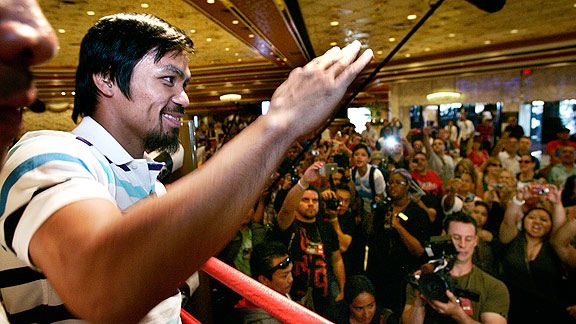
LAS VEGAS -- Wherever Manny Pacquiao goes, it seems there are crowds waiting to cheer him. Today, for example, it has taken him 30 minutes to fight his way from the entrance of the MGM Grand to a small group of reporters waiting in a room at the other end of the lobby. It is a degree of adoration that has prompted his promoter, Bob Arum, with perhaps just a pinch of hyperbole -- but not necessarily much more than that -- to dub Pacquiao the most popular athlete in the world today. It is a designation from which the man himself shrinks.
"You know, I tell you, I never think myself that I'm popular," Pacquiao said. "I want to live simple. That's why I like to have a lot of friends, you know? Joking, joking. I never think to myself, 'Oh, I'm popular, I'm big man.' I don't want to be arrogant. I don't like that. We're the same -- same hearts, same feelings."
Nonetheless, being Manny Pacquiao means being presented with opportunities that are not available to everybody else -- such as meeting the president of the United States, as Pacquiao did during a visit to Washington, D.C., on Feb. 15.
"I'm impressed, he was so nice, very approachable," Pacquiao said. "I like him. He said, 'I will try to visit the Philippines, I will see you there.'"
Their conversation inevitably turned to sports.
"I said, 'Oh, Mr. President, I hear you like basketball.' He said, 'I also like boxing. I watch all the fights on pay-per-view.' I tried to invite him to watch this fight on Saturday, but he said, 'I'll definitely watch the fight, but on pay-per-view.'"
Like the commander-in-chief, the congressman from Sarangani is an avid hoops player. Does he think he could best the 44th president one-on-one?
Pacquiao paused, smiled and searched for a diplomatic answer.
"He's very tall," he offered, and laughed.
Pacquiao's appearance in the nation's capital was not for purely promotional purposes; he met with Senate Majority Leader Harry Reid, for whom he stumped in the November midterms, to discuss a Senate bill that would enable an increase in the level garment imports from the Philippines relative to those from China. As he discusses the bill, Pacquiao seems briefly animated, much more so than when discussing boxing or himself, recognition of the seriousness and enthusiasm with which he approaches his second career. It is a career about which he has been dreaming, in some form or another, for many years, one which has its roots in the extreme poverty into which he was born.
"When I started fighting in the ring, started fighting as a professional, every time I saw the poor people sleeping in the street, I started thinking that maybe someday I can help them, give them food," he said. "I wasn't thinking about going into politics. But my dream was, maybe I can give them food. I feel what they're feeling, sleeping in the street. Because I've been there. I never thought that I would achieve what I have right now. What I dreamed before was to have my mother, my family to survive in life. Once, we had no food. We didn't eat. That's why my sacrifices, what I have done, it's for my family. It's for all of us."
Those sacrifices have brought him great wealth and constant adoration. But his boxing career is nearer to its end than its beginning, and however popular he may be as a politician, his future popularity will likely never rival the fervor he inspires now as a boxer. When the crowds diminish, though, Pacquiao insists he will not miss them but regard their passing merely as an inevitability.
"I have to understand, things will pass," he said. "But I'm happy and satisfied with what I've done in boxing. I'm part of the history of boxing. I contribute at least to the record of boxing. When I retire, hopefully some people will remember me."
No comments:
Post a Comment